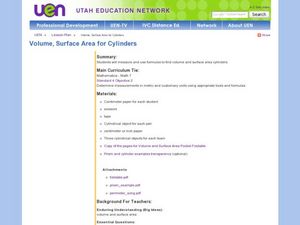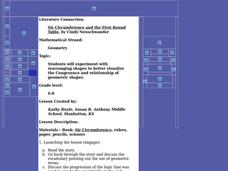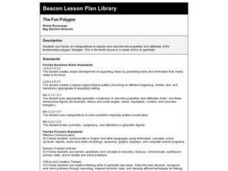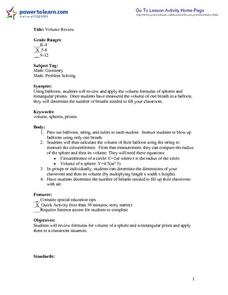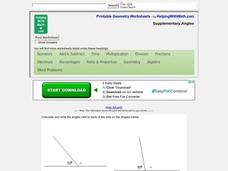Curated OER
Volume, Surface Area for Cylinders
Seventh graders explore the concept of volume and surface area of cylinders. In this volume and surface area of cylinders lesson, 7th graders break cylinders into their base shapes of a circle and a rectangle. Students discover that...
EngageNY
Translations
Learn through constructions! Learners examine a translation using constructions and define the translation using a vector. Pupils then construct parallel lines to determine the location of a translated image and use the vector as a guide.
Curated OER
"Sir Cumference and the First Round Table" by Cindy Neuschwander
Middle schoolers experiment with rearranging shapes to better visualize the Congruence and relationship of geometric shapes.
Curated OER
Conic Sections and Locii
Students differentiate between ellipse and hyperbola. In this algebra lesson, students graph and solve elliptical equations. They use the cabri program to create the different conics and move them around.
Beacon Learning Center
The Fun Polygon
Junior geometers use hands-on manipulatives to explore and describe the properties and attributes of a fundamental polygon, the triangle. They learn different kinds of angles and their measurements. This well-written lesson plan provides...
Curated OER
Reflected Triangles
Your learners find and construct the line of reflection between a triangle's pre-image and its reflection image in this short activity.
EngageNY
Polynomial, Rational, and Radical Relationships
This assessment pair goes way beyond simple graphing, factoring and solving polynomial equations, really forcing learners to investigate the math ideas behind the calculations. Short and to-the-point questions build on one another,...
Curated OER
Lesson Plan Outline for Rainbow Science
Young scientists study light reflection and refraction as they determine the critical angle, the rainbow angle, and color separation in rainbows. Teams record the data they collect in a shared spreadsheet and discuss results with the class.
Illustrative Mathematics
Running Around a Track I
The accuracy required by the design and measurement of an Olympic running track will surprise track stars and couch potatoes alike. Given a short introduction, the class then scaffolds into a detailed analysis of the exact nature of the...
Curated OER
Investigating the Idea of Tan
Fifth graders use tan to solve problems involving right-angled triangles. They solve equations of the form tan(8) =a, for a between 180 degrees and 360 degrees. They state the value of tan (8) in special cases.
Curated OER
Volume Review
Students investigate the concepts of volume for rectangular prisms and spheres. They measure the volume of one balloon and then consider how many breaths it would take to fill the room with balloons. The rectangular prism being measured...
Curated OER
Building Bridges
Learners identify the different types of bridges. Using the internet, they research information on how they are built by completing a scavenger hunt. Locating a specific area, they determine which type of bridge would be appropriate and...
Helping with Math
Supplementary Angles
Pupils calculate the measurement of supplementary angles when one angle is known. The one-page assignment has six simple problems. It contains links to related resources as well as the answer key. Be aware that although the publisher...
Curated OER
Embossed Rose Window Designs
Students, after researching the history and foundation of Renaissance rose windows, access ArtEmboss to create an original window design. They employ a basic metalworking technique utilizing a soft metal. The design created incorporates...
Curated OER
TE Activity: Super Spinners!
Students make spinners to investigate rotational inertia, rotational speed, angular momentum, and velocity. They make two sets of spinners that have different mass distributions and shapes. They complete a worksheet while experimenting...
Helping with Math
Angles: Supplementary, Corresponding & Alternate (2 of 2)
In the second of two similar worksheets, anglers compute missing angles when given an alternate, supplementary, or complementary value. There are six problems to solve, but each of them requires two to four solutions. This is a nice...
Helping with Math
Angles: Supplementary, Corresponding & Alternate (1 of 2)
In the first of two similar worksheets, geometers compute two to four unknown angles when given an alternate, supplementary, or complementary value. There are six multliple-step problems to solve. This is a nice challenge for your...
Curated OER
Seeing Solar Storms in STEREO-I
In this geometric calculations of solar storms activity, students use a diagram indicating the location of 2 STEREO satellites, the earth and the sun to calculate the distance between a Coronal Mass Ejection and the Earth. They use...
Curated OER
Pape's Theorems
In this math worksheet, students find the length of the side of a regular hexagon whose area is numerically equal to its perimeter.
Curated OER
Have You Got the Angle?: Pre Test
In this angles worksheet, students complete multiple choice questions about the shape and number of angles. Students complete 10 questions total.
Curated OER
Volume, Surface Area for Rectangular & Triangular Prisms
Seventh graders explore the concept of rectangular and triangular prisms. In this rectangular and triangular prism lesson, 7th graders identify various prisms as triangular or rectangular. Students discuss the various shapes of bases...
Curated OER
What on Earth is Greater Than?
Students compare things that are greater than, less than, or equal to, compare the Earth to other planets, and list planets from greatest size to smallest size.
Curated OER
Classifying and Constructing Corners
Fifth graders, after seeing Honeycomb examples, complete a Classifying Angles worksheet, Clock worksheet, and Defining Angles worksheet.
